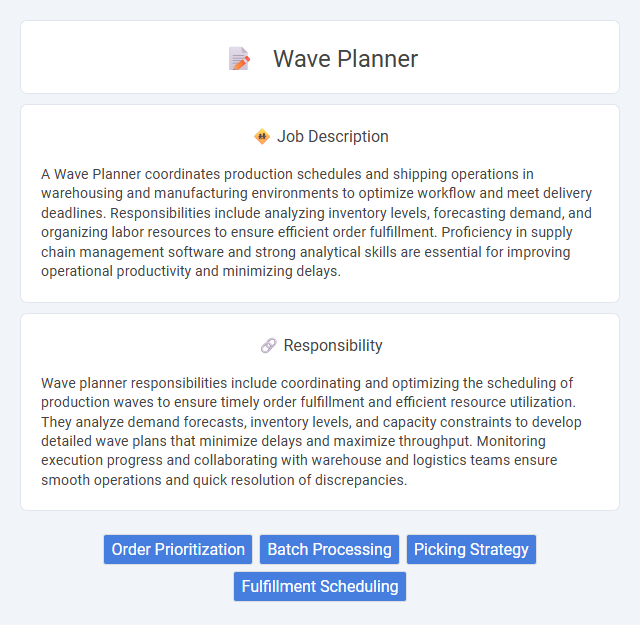
A Wave Planner coordinates production schedules and shipping operations in warehousing and manufacturing environments to optimize workflow and meet delivery deadlines. Responsibilities include analyzing inventory levels, forecasting demand, and organizing labor resources to ensure efficient order fulfillment. Proficiency in supply chain management software and strong analytical skills are essential for improving operational productivity and minimizing delays.
Wave planner roles may suit individuals who are detail-oriented, enjoy managing logistics, and can thrive under pressure to meet tight deadlines. Those with strong organizational skills and the ability to analyze data for efficient resource allocation are likely to perform well. People who struggle with fast-paced environments or complex coordination might find this job challenging.
Qualification
Wave planners require a strong background in supply chain management, logistics, or industrial engineering, often supported by a bachelor's degree in a related field. Proficiency in inventory management systems, advanced Excel skills, and experience with ERP software like SAP or Oracle is essential to efficiently coordinate production schedules. Strong analytical skills and the ability to optimize workflow and resource allocation under tight deadlines are critical qualifications for success in this role.
Responsibility
Wave planner responsibilities include coordinating and optimizing the scheduling of production waves to ensure timely order fulfillment and efficient resource utilization. They analyze demand forecasts, inventory levels, and capacity constraints to develop detailed wave plans that minimize delays and maximize throughput. Monitoring execution progress and collaborating with warehouse and logistics teams ensure smooth operations and quick resolution of discrepancies.
Benefit
Wave planner jobs likely offer significant benefits such as enhancing operational efficiency and improving workflow management in logistics or production environments. Professionals in this role probably experience increased coordination between teams, leading to smoother delivery processes and reduced downtime. This position may also provide opportunities for skill development in forecasting and scheduling, contributing to overall career growth.
Challenge
Wave planner roles likely involve managing complex production schedules that require balancing supply chain variables, making the job inherently challenging. The need to anticipate demand fluctuations and coordinate multiple resources could increase the difficulty of ensuring timely and efficient workflow. Constant problem-solving and adaptability might be key skills required to successfully handle the unpredictable nature of wave planning.
Career Advancement
Wave planner roles offer significant career advancement opportunities by developing expertise in supply chain optimization, logistics coordination, and demand forecasting. Professionals in this position gain valuable skills in inventory management and production scheduling, which are critical for progressing to senior supply chain analyst or operations manager roles. Mastery of advanced planning systems and data analysis tools enhances employability in strategic planning and leadership positions within manufacturing and distribution sectors.
Key Terms
Order Prioritization
Wave planners optimize order fulfillment by strategically grouping customer orders into waves based on priority, shipment deadlines, and resource availability. They utilize advanced algorithms and warehouse management systems (WMS) to maximize picking efficiency and reduce labor costs. Effective order prioritization directly improves on-time delivery rates and enhances overall supply chain performance.
Batch Processing
Wave Planner jobs involve optimizing batch processing workflows to enhance warehouse efficiency and reduce delivery times. Expertise in coordinating wave releases, managing order consolidation, and synchronizing batch picking operations is essential for maximizing throughput. Proficiency in warehouse management systems (WMS) and data analytics tools supports effective execution of wave planning strategies in fast-paced distribution centers.
Picking Strategy
Wave planner roles focus on optimizing warehouse picking strategies by grouping orders into waves, allowing synchronized picking tasks to maximize efficiency. Effective wave planning reduces travel time for pickers, improves resource allocation, and accelerates order fulfillment cycles. This strategy leverages real-time data and inventory management systems to dynamically adjust waves based on demand and operational capacity.
Fulfillment Scheduling
Wave planning in fulfillment scheduling optimizes order batching to enhance warehouse efficiency and accuracy. It involves grouping orders based on criteria like shipping deadlines, item locations, and resource availability, ensuring streamlined picking and packing processes. Effective wave planner roles significantly reduce fulfillment time and operational costs while maximizing throughput.
 kuljobs.com
kuljobs.com